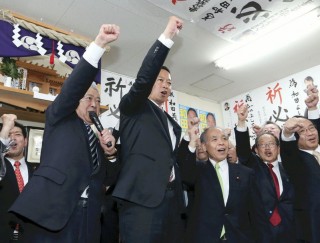Loading
Search
▼ Japan in Depth / Organizational Power Won The Day
- Category:Other
The Yomiuri Shimbun
SAPPORO — With the victory of a candidate backed by them, the ruling parties will now aim to further consolidate their forces for the House of Councillors election this summer.
Opposition parties are set to accelerate efforts to step up their united-front offensive, though internal discord seems to have surfaced.
After winning, Liberal Democratic Party rookie Yoshiaki Wada said at his office on Sunday night that his “pledge to prioritize the economy seemed to have reached the voters. I was anxious until the very end, my heart was in my mouth.”
The latest race was one of two lower house by-elections held on Sunday. Forced to fight an unexpectedly tough battle, the ruling bloc was not caught up in a particularly strong mood of victory in Hokkaido.
“We were teetering on the brink of defeat,” a senior LDP member said. “Things could have swung either way.”
The Hokkaido by-election was held to fill a vacant seat resulting from the death of former lower house Speaker Nobutaka Machimura. Wada is Machimura’s son-in-law, so there was optimism at the start among the rookie’s camp, as the race was seen as a “battle to memorialize Machimura.”
But a series of scandals and verbal gaffes by LDP members gave the public the impression they were arrogant, allowing opposition parties to close in.
An anxious Prime Minister Shinzo Abe responded by aggressively pressing for the consolidation of organizational influence.
About 280 visits by LDP Diet members were made to the Hokkaido constituency to canvas local companies and industry associations. Abe could not make the trip because he had to deal with the aftermath of a series of powerful earthquakes that mainly jolted Kumamoto Prefecture, but he obtained lists of local assembly members and supporters to call them asking for support.
“We can’t lose this race,” Abe stressed during his calls.
Summer showdown
Soka Gakkai, the power base of Komeito, also threw all its weight behind Wada.
The government and the ruling bloc decided not to seek Diet approval of the signing of the Trans-Pacific Partnership free trade pact and relevant bills during the current Diet session. A senior LDP member said the decision was meant to “avoid losing agriculture-related voters critical of the TPP.”
There are several Self-Defense Forces facilities in the cities of Chitose and Eniwa, which are part of Hokkaido Constituency No. 5. Since SDF activities in disaster-hit areas were in the public eye, some observers said the situation apparently worked in favor of the ruling parties.
Even so, the ruling bloc allowed a close battle against the opposition camp in the latest by-election.
“Candidates jointly backed by opposition parties can become tough competitors in the upper house election,” a Komeito executive said.
These concerns underscore the increasing likelihood this summer of a rivalry between an LDP-Komeito candidate and a candidate jointly backed by opposition parties among the 32 upper house constituencies across Japan where only a single seat is up for grabs.
Opposition emboldened
After independent Maki Ikeda was defeated in the by-election in Hokkaido Constituency No. 5, she bowed and said: “I’m sorry I wasn’t able to win. I deeply regret the disappointing outcome.”
But the four opposition parties that backed Ikeda, including the Democratic Party (Minshinto, DP) and the Japanese Communist Party, could actually be demonstrating how effective a united front can be. Ikeda fought a very close battle in her loss to a ruling party-backed candidate.
“We’re feeling confident, through cooperation between civil movements and opposition parties,” DP Secretary General Yukio Edano said in an announcement on Sunday night, “that we’ll be able to speak for voters criticizing the current administration.”
To draw support from a wide range of voters in the latest by-election, the four opposition parties softened their political party affiliations. They also spotlighted a civil group calling for the abolition of security-related legislation to demonstrate “confrontation between citizens and the administration of Prime Minister Shinzo Abe.”
During the actual campaign, the JCP arranged separate meetings between Ikeda and organizations and companies that support the party to ensure organizational support — while local senior DP members visited JCP offices to work together on a by-election strategy. Such efforts underscored how the four opposition parties were closely cooperating to try and form a united front.
A host of problems surfaced, however. For example, several parties distributed the same policy leaflets in the same area. A senior DP member also said that they “couldn’t fight effectively in the by-election because we didn’t have someone in charge.”
- April 26, 2016
- Comment (0)
- Trackback(0)


